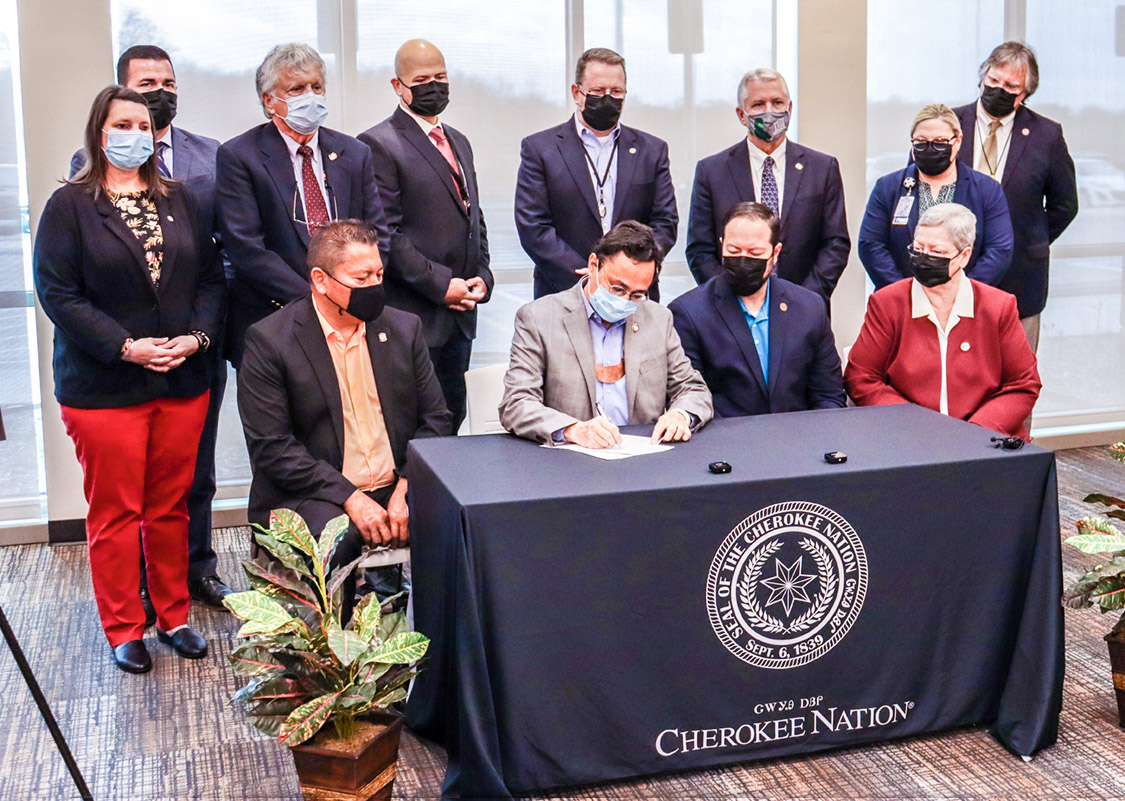Indianz.Com > News > Gaylord News: Tribes eager for more ‘Buy Indian’ opportunities
Expanded Buy Indian Act expected to provide economic boost to tribal enterprises
Monday, March 14, 2022
Gaylord News
WASHINGTON, D.C. — Oklahoma tribes are hopeful an update to a century-old law will spur tribal economies and create a uniform approach to contracting procedures involving the Bureau of Indian Affairs and the Indian Health Service.
The Buy Indian Act, created in 1910 to set aside government procurement contracts for Native-owned businesses, affects only the BIA and IHS. Still, in 2015 the Government Accountability Office reported only 12% to 15% of IHS contracts went to Indian-owned businesses, and it suggested sweeping reform is needed to increase contract opportunities.
Sen. John Hoeven, R-N.D., sponsored the Indian Community Economic Enhancement Act of 2020, which amended three federal economic laws. It requires the IHS and BIA to create a uniform approach to Buy Indian Act procurement procedures to “reduce red tape that limits Indian business promotion.” The bill also expanded access to capital for tribes and increased opportunities for Native business promotion.
On January 13, the IHS released its final rule on the Buy Indian Act in response to the BIA’s final rule, which was released in December. The IHS said benefits of its final rule include expanding the Buy Indian Act to include all construction and removing regulatory burdens by allowing Indian economic enterprises to increase subcontracts, removing construction restrictions for the enterprises and clarifying the language of the act and its procedures. Oklahoma tribal leaders say the new regulations could provide the economic boost they’ve been seeking. “These new provisions are a step in the right direction, and I believe many tribes, including our business arm, may want to take advantage of the opportunity,” said Chuck Hoskin Jr., principal chief of the Cherokee Nation. Hoskins said updated Buy Indian Act procedures will energize Native businesses. One of the largest updates expands the act over all construction, including health care facilities, personnel quarters, water supply and waste disposal facilities. The final rule by BIA and IHS also emphasizes the commitment to purchasing Native products and hiring Native labor without the typicalThe Indian Health Service is announcing the final rule on the Buy Indian Act to strengthen requirements to set aside contracts for Indian-owned and controlled businesses. Read more: https://t.co/a8DfLkNcKJ #NativeHealth #IndianCountry pic.twitter.com/ZTWE8h6pJS
— IndianHealthService (@IHSgov) January 13, 2022


Federal Register Notice
Acquisition Regulations: Buy Indian Act; Procedures for Contracting (January 13, 2022)
Senate Committee on Indian Affairs Notice
Oversight Hearing “Buy Native American: Federal Support for Native Business Capacity Building and Success” (March 16, 2022)
Gaylord News is a reporting project of the University of Oklahoma Gaylord College of Journalism and Mass Communication. For more stories from Gaylord News, visit gaylordnews.net.
For more stories from Cronkite News, visit cronkitenews.azpbs.org.
Note: This story originally appeared on Cronkite News. It is published via a Creative Commons license. Cronkite News is produced by the Walter Cronkite School of Journalism and Mass Communication at Arizona State University.
Search
Filed Under
Tags
More Headlines
Native America Calling: Tribes ponder blood quantum alternative
Defense bill snubs Indian Country in favor of Lumbee federal recognition
NAFOA: 5 Things You Need to Know this Week (December 8, 2025)
Chuck Hoskin: Cherokee Nation benefits from extension of health care credits
Native America Calling: Tribal museums reflect on tumultuous year, chart their next steps
Press Release: National Museum of the American Indian hosts Native art market
AUDIO: Sea Lion Predation in the Pacific Northwest
Native America Calling: Tribal colleges see an uncertain federal funding road ahead
Native America Calling: Short films taking on big stories
Native America Calling: Advocates push back against new obstacles to Missing and Murdered Indigenous Relatives momentum
Native America Calling: For all its promise, AI is a potential threat to culture
NAFOA: 5 Things You Need to Know this Week (November 24, 2025)
Chuck Hoskin: Cherokee Nation invests in rural transportation
Native America Calling: Native candidates make strides in local elections
National Congress of American Indians returns incumbents and welcomes newcomers to leadership
More Headlines
Defense bill snubs Indian Country in favor of Lumbee federal recognition
NAFOA: 5 Things You Need to Know this Week (December 8, 2025)
Chuck Hoskin: Cherokee Nation benefits from extension of health care credits
Native America Calling: Tribal museums reflect on tumultuous year, chart their next steps
Press Release: National Museum of the American Indian hosts Native art market
AUDIO: Sea Lion Predation in the Pacific Northwest
Native America Calling: Tribal colleges see an uncertain federal funding road ahead
Native America Calling: Short films taking on big stories
Native America Calling: Advocates push back against new obstacles to Missing and Murdered Indigenous Relatives momentum
Native America Calling: For all its promise, AI is a potential threat to culture
NAFOA: 5 Things You Need to Know this Week (November 24, 2025)
Chuck Hoskin: Cherokee Nation invests in rural transportation
Native America Calling: Native candidates make strides in local elections
National Congress of American Indians returns incumbents and welcomes newcomers to leadership
More Headlines